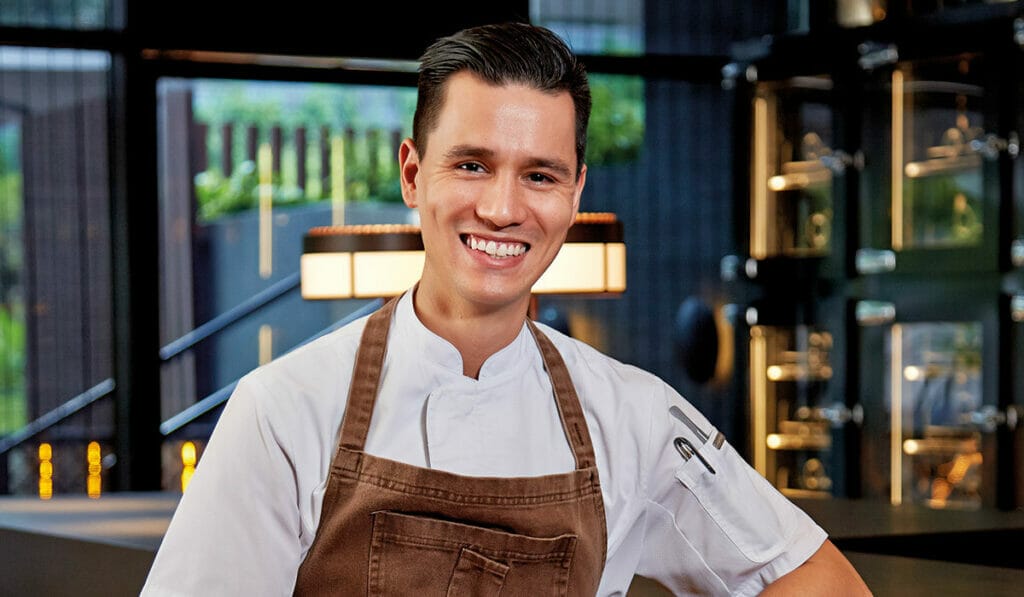There are four siblings in our family and my mom was there for the ï¬rst 12 years or so of my life, so we very well looked after. She then felt we were old enough and decided to go back to work. She’d always leave food for us but, sometimes, we just wanted something different. So, we’d go to the fridge, pull stuff out, cut them up as best as we can and threw it all into a pan! Slowly, we got better and the things we cooked started tasting better.
I was quite fortunate as my school in Vancouver offered a culinary arts programme. It was very, very basic: you learn the basic mother sauces, cutting techniques and really simple cooking techniques. And that really hooked me.
I decided I wanted to cook and everyone in my family was totally against it. It got to the point where I actually got sat down with my school counsellor by my parents, who were so concerned that their son was making the worst choice in his life! Even my mentor at that time, my culinary arts teacher, was against it. They talked about the low pay and long hours, and having to work on birthdays and weekends, but I didn’t care – I still wanted to do it.
(Related: The Dilmah Tea Company’s Merrill J Fernando Reveals What Drives His Business )
I started at McDonald’s before I got a dishwashing job at a restaurant. Then I became a prep cook and line cook before I went back to school. Funnily enough, I was advised not to bother going back to school! In hindsight, cooking school didn’t really do that much, but it did teach me about cost control and expose me to bakery, which I didn’t know much about, for instance. More importantly, when I started winning cooking competitions, I started getting noticed and that opened up more opportunities for me.
I was working in Australia before I came to Malaysia. I always knew Australia was never going to be a long-term thing. I had always wanted to come to South-East Asia and someone contacted me about this job. I was told that the concept would be modern Malaysian and I had about a week to prepare a food tasting for the owners.
I knew nothing about Malaysia then, so I had my work cut out for me. Google became my best friend when I was researching about Malaysian food and ingredients. Then I got on a plane, arrived in Kuala Lumpur on a Sunday, spent the whole of Monday preparing and presented the next day noon. It was a very intense day.
(Related: Perrier-Jouët Brand Ambassador Jean-Baptiste Gourvil talks champagne )
My perception of Malaysian food is that it an ingredient-driven cuisine. Take Sarawak laksa, for example: what makes it so special is the ingredients that you ï¬nd over there that you don’t get here. And it’s same for nasi lemak – you focus on the ingredients, the freshness and quality, and flavour proï¬les.
That is what’s behind the food at ATAS, as well as taking what I’ve enjoyed eating in my time here. It could something as simple as a sambal or ulam I had somewhere and I try to incorporate them into the menu, recreating the memory of what I tasted.
It was a bit difficult at ï¬rst for people to understand the food that we cook but it’s been very well accepted so far. We concentrate on the flavour proï¬les are still there, essentially using Malaysian ingredients and putting the spotlight on them.
It’s not always easy getting the ingredients we use because they’re not widely used or commercially available. It has taken a lot of time to source or ï¬nd people who speciï¬cally grow them for us. It’s also a challenge trying to make sure we get the right quality of ingredients.
What I love about my job is that I can be creative and express myself. I enjoy cooking good food and watching people enjoy themselves. I also like the mentoring opportunities, sharing my philosophy and how I view food.
(Related: Woodworker and Furniture Designer Thomas Hucker Reveals The Secret To Crafting A Masterpiece)
Here at ATAS, I’m here from breakfast all the way to dinner, and I try to show the kitchen staff a better way of working and helping them get a better understanding of ingredients by taking them to farms, for example, so that they know exactly where the produce we use come from.
I’m not trying to change world cuisine or anything. If there’s a legacy I’d like to leave behind, it would be that I’d be known for good quality food and big, bold flavours. I’d like people to remember me for good, honest food.



